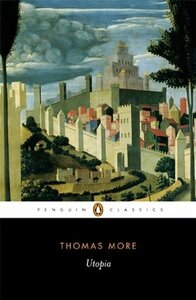Take a photo of a barcode or cover
Interesting read, just not enjoyable for my particular taste.
challenging
informative
reflective
slow-paced
Plot or Character Driven:
Plot
Strong character development:
N/A
Loveable characters:
N/A
Diverse cast of characters:
N/A
Flaws of characters a main focus:
N/A
No place. For a 500 year old book, some of the ideas are very modern. "In fact when I consider any social system that prevails in the modern world, I can't ,so help me God, see it as anything but a conspiracy of the rich to advance their own interests under the pretext of organising society."
Was Thomas More a socialist? The age doesn't seem to suggest it so, neither do his education and goals. A big enthusiast of spiritual learning and humor himself, he wrote a precisely accurate critique of the England of his day. A man of an undoubtedly ascending political career, way too tied to whatever the King decided (it was the 1500s after all) and influenced by Erasmus. Free speech was one of his passions, but no, there was no First Amendment to attain to, in case the King considered you were not worthy to express your opinion.
Besides, I think that by reading this book closely, one can deduce that More did not conceive Utopia as the ideal society. Perhaps a flawed misreading of it helped the erroneous conception to take place.
Why did Utopia, possibly the biggest joke of all time (and meant as a compliment) turn into a favorite of socialists? Who knows. Abolishing private property? Is that what Common Good necessarily is? They seem to think it so, at least in theory.
But, getting away from the many (mis)interpretations of the book and the man himself, especially when you can read about these from people who are far more experienced than myself, like for example the excelent summary of the question of interpretation by George Logan, in the edition of the Moreana magazine published in June of 1994, and the biography by Gerard Wegemer (both available at the Thomas More Studies Center)... or the one by Louis Bouyer, should take most of doubts away. The man's faith was evident in his trial period of staying with Carthusians, one of the most strict orders, and still having kept some of their discipline as a married man, or his defense of faith against Luther and Tyndale's heresies.
Yes, it is possible after all for a saint to have a great sense of humor. Didn't San Josemaría have one? There's hope for Chesterton in that department, why not Thomas More? Of course, it's refined, carefully crafted English humor. You won't have explicit decadence of the human race as in Rabelais.
But the escapism was so strong people preferred to believe the tales of travelers, even when their surnames were Hytlodeus, which means "expert in vain words".
The tongue in cheek names for the river or the city itself, the allusions to America, the fantastic use of margin notes (shesh! Should've said medieval gloss) really make the book for me. I should've never have judged it so harshly the first time I read it.
The figure of the unreliable narrator, something that to our disgrace we associate much more with modernism, was present here. Some things of the medieval vision of the world were floating through the pages. But there's no one you can trust here. Not even More, and you're warned in the first pages because he's a busy man.
And now, that my veneration for this noble statesman is firmly based, and reinforced by attempting to truly understand this book beyond my contemporary ignorance and prejudice, I should definitely read his epigrams and letters... or maybe poems, then!
Besides, I think that by reading this book closely, one can deduce that More did not conceive Utopia as the ideal society. Perhaps a flawed misreading of it helped the erroneous conception to take place.
Why did Utopia, possibly the biggest joke of all time (and meant as a compliment) turn into a favorite of socialists? Who knows. Abolishing private property? Is that what Common Good necessarily is? They seem to think it so, at least in theory.
But, getting away from the many (mis)interpretations of the book and the man himself, especially when you can read about these from people who are far more experienced than myself, like for example the excelent summary of the question of interpretation by George Logan, in the edition of the Moreana magazine published in June of 1994, and the biography by Gerard Wegemer (both available at the Thomas More Studies Center)... or the one by Louis Bouyer, should take most of doubts away. The man's faith was evident in his trial period of staying with Carthusians, one of the most strict orders, and still having kept some of their discipline as a married man, or his defense of faith against Luther and Tyndale's heresies.
Yes, it is possible after all for a saint to have a great sense of humor. Didn't San Josemaría have one? There's hope for Chesterton in that department, why not Thomas More? Of course, it's refined, carefully crafted English humor. You won't have explicit decadence of the human race as in Rabelais.
But the escapism was so strong people preferred to believe the tales of travelers, even when their surnames were Hytlodeus, which means "expert in vain words".
The tongue in cheek names for the river or the city itself, the allusions to America, the fantastic use of margin notes (shesh! Should've said medieval gloss) really make the book for me. I should've never have judged it so harshly the first time I read it.
The figure of the unreliable narrator, something that to our disgrace we associate much more with modernism, was present here. Some things of the medieval vision of the world were floating through the pages. But there's no one you can trust here. Not even More, and you're warned in the first pages because he's a busy man.
And now, that my veneration for this noble statesman is firmly based, and reinforced by attempting to truly understand this book beyond my contemporary ignorance and prejudice, I should definitely read his epigrams and letters... or maybe poems, then!
i deserve financial compensation for being forced to read this
three stars because i did not have an altogether unpleasant experience whilst reading this (would like to make it clear that i am a history nerd and was reading this for that purpose alone)
informative
reflective
slow-paced
Some great ideas.. some crazy ideas... very puzzling to read...
1) [On advising counsellors] ''They'll behave as though their professional reputations were at stake, and they'd look fools for the rest of their lives if they couldn't raise some objection to your proposal. Failing all else, their last resort will be: 'This was good enough for our ancestors, and who are we to question their wisdom?' Then they'll settle back in their chairs, with an air of having said the last word on the subject -- as if it would be a major disaster for anyone to be caught being wiser than their ancestors!''
''Though, to tell you the truth, my dear More, I don't see how you can ever get any real justice or prosperity, so long as there's private property, and everything's judged in terms of money -- unless you consider it just for the worst sort of people to have the very best living conditions, or unless you're prepared to call a country prosperous, in which all the wealth is owned by a tiny minority -- who aren't entirely happy even so, while everyone else is simply miserable.''
''The slaughtering of livestock and cleaning of corpses is done by slaves. They don't let ordinary people get used to cutting up animals, because they think it tends to destroy one's natural feelings of humanity.''
''You see how it is -- wherever you are, you always have to work. There's never any excuse for idleness. There are also no wine-taverns, no ale-houses, no brothels, no opportunities for seduction, no secret meeting-places. Everyone has his eye on you, so you're practically forced to get on with your job, and make some proper use of your spare time.''
''Though, to tell you the truth, my dear More, I don't see how you can ever get any real justice or prosperity, so long as there's private property, and everything's judged in terms of money -- unless you consider it just for the worst sort of people to have the very best living conditions, or unless you're prepared to call a country prosperous, in which all the wealth is owned by a tiny minority -- who aren't entirely happy even so, while everyone else is simply miserable.''
''The slaughtering of livestock and cleaning of corpses is done by slaves. They don't let ordinary people get used to cutting up animals, because they think it tends to destroy one's natural feelings of humanity.''
''You see how it is -- wherever you are, you always have to work. There's never any excuse for idleness. There are also no wine-taverns, no ale-houses, no brothels, no opportunities for seduction, no secret meeting-places. Everyone has his eye on you, so you're practically forced to get on with your job, and make some proper use of your spare time.''
definitely an interesting satire. pretty funny to read after playing final fantasy xiv lol





